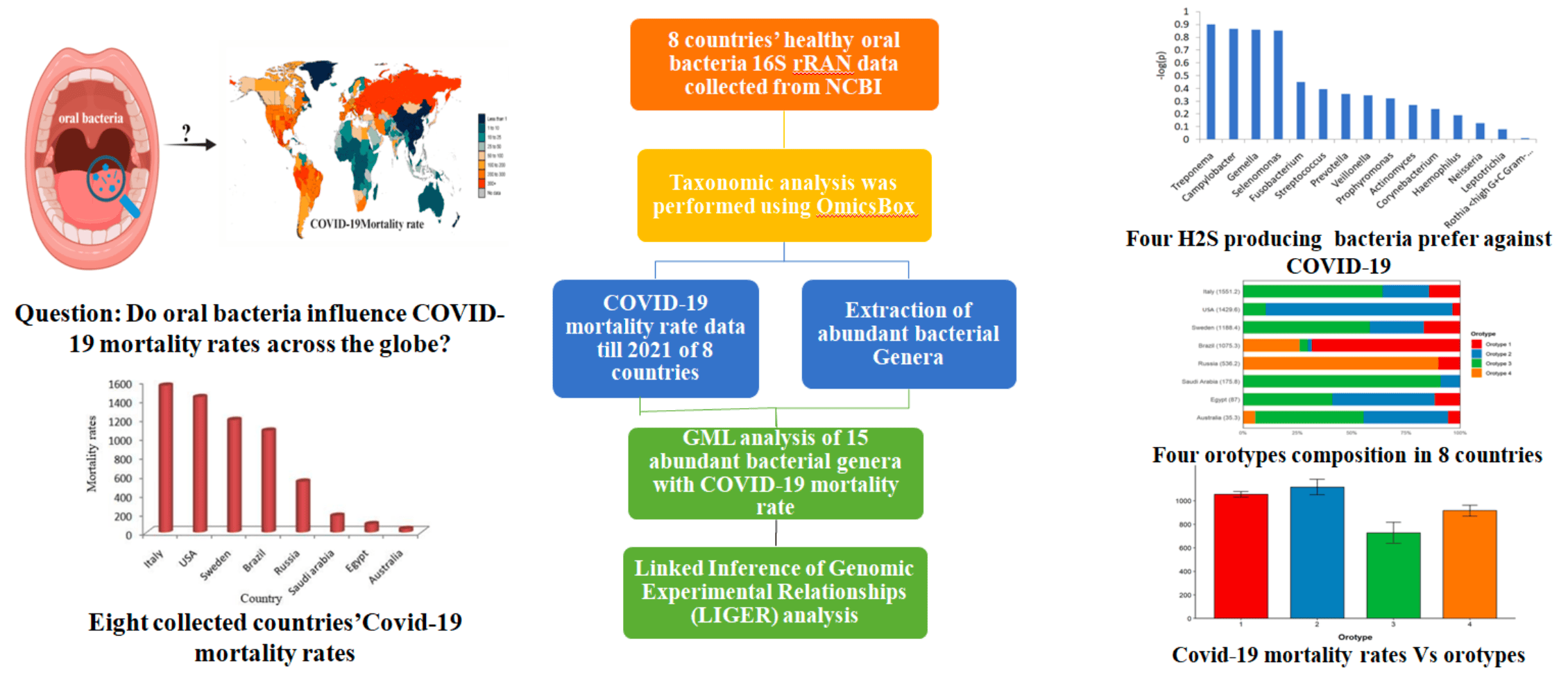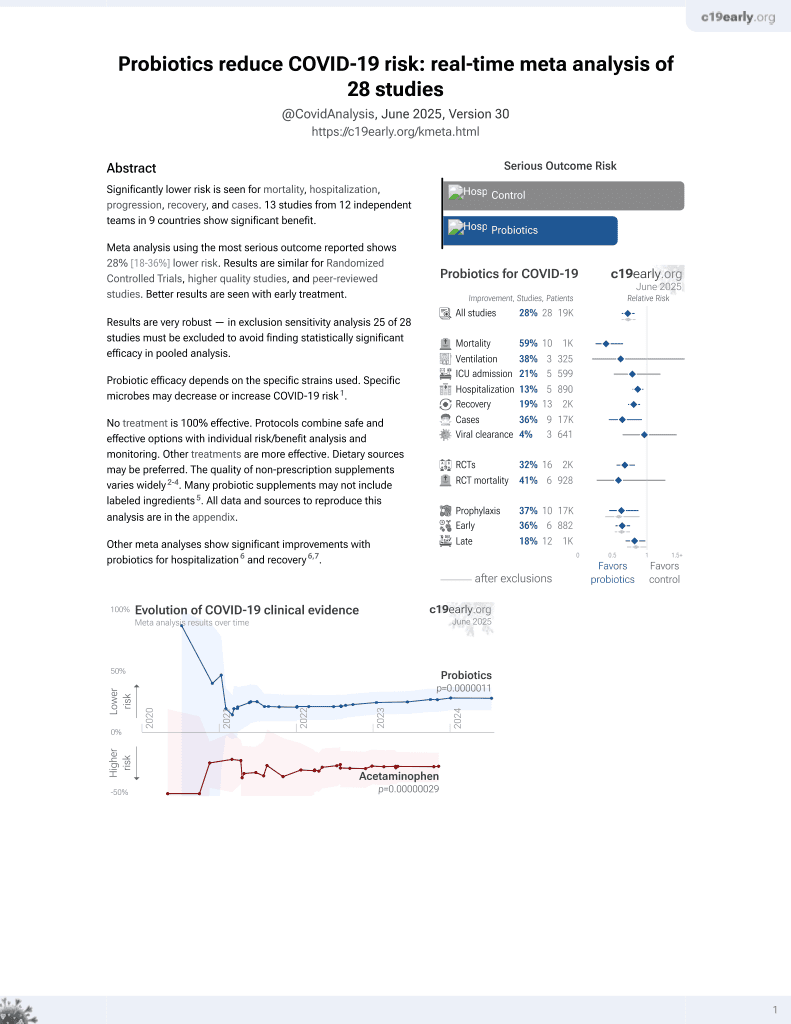
Hydrogen Sulfide (H₂S)-Producing Oral Bacteria May Protect Against COVID-19
et al., medRxiv, doi:10.1101/2024.08.07.24311606, Aug 2024
Probiotics for COVID-19
20th treatment shown to reduce risk in
March 2021, now with p = 0.00000044 from 29 studies.
No treatment is 100% effective. Protocols
combine treatments.
6,400+ studies for
210+ treatments. c19early.org
|
Bioinformatics analysis of oral microbiome data from 244 healthy subjects across 8 countries showing an association between higher levels of hydrogen sulfide-producing oral bacteria and lower COVID-19 mortality rates. Authors hypothesize that hydrogen sulfide produced by these bacteria may protect against SARS-CoV-2 infection through antiviral effects, blocking viral entry, suppressing inflammation, and boosting antioxidant defenses. Results suggest that probiotic treatments containing hydrogen sulfide-producing oral bacteria may be beneficial for COVID-19.
Probiotic efficacy depends on the specific strains used. Specific microbes may decrease or increase COVID-19 risk1.
Vaishnani et al., 8 Aug 2024, preprint, 4 authors.
Contact: bp2580@googlemail.com, anupamarmodi@gmail.com.
Hydrogen Sulfide (H₂S)-Producing Oral Bacteria May Protect Against COVID-19
doi:10.1101/2024.08.07.24311606
COVID-19 mortality rates have varied dramatically across the globe. Yet the reasons behind these disparities remain poorly understood. While recent research has linked gut microbes to these variations, the role of oral bacteria, a main port of entry for the coronavirus, remains unexplored.We investigated the relationship between oral microbiota and COVID-19 mortality rates across eightcountries. Raw sequencing data of 16S rRNA regions from oral microbiota in 244 healthy subjects from eight countries were obtained from public databases. We employed a generalized linear model (GLM) to predict COVID-19 mortality rates using oral microbiota composition. GLM revealed that high abundances of hydrogen sulfide (H₂S)-producing bacteria, particularly Treponema, predicted low COVID-19 mortality rates with a markedly low p-value. Unsupervised clustering using a combination of LIGER and t-SNE yielded four oral microbiome "orotypes." Orotypes enriched in H₂S-producing bacteria coincided with lower mortality rates, while orotypes harboring Haemophilus or Rothia were associated with increased vulnerability. To validate our findings, we analyzed influenza mortality data from the same countries, observing similar protective trends. Our findings suggest that oral bacteria-produced H₂S may serve as a critical initial defense against SARS-CoV-2 infection.H₂S from oral bacteria may prevent infection through antiviral activity, blocking ACE2 receptors, suppressing cytokines, and boosting antioxidants. This highlights the oral microbiome's role in COVID-19 outcomes and suggests new preventive and therapeutic strategies.
Authour Contribution BP conceptualized the study, performed data analysis, interpreted the data, and wrote the manuscript. MV conducted data analysis, participated in the creation of graphics, tables, and charts, and managed the submission process. AM reviewed, edited, and refined the manuscript, and coordinated the submission process. KC assisted with initial data collection efforts and offered input on the taxonomic analysis approach.
Supplementary Information
List of legend
Supplementary information of legend
References
Bazhanov, Escaffre, Freiberg, Garofalo, Casola, Broad-range antiviral activity of hydrogen sulfide against highly pathogenic RNA viruses, Scientific reports
Bourgonje, N-Acetylcysteine and Hydrogen Sulfide in Coronavirus Disease 2019, Antioxidants & Redox Signaling, doi:10.1089/ars.2020.8247
Chang, Chang, He, Tan, The determinants of COVID-19 morbidity and mortality across countries, Scientific reports
Citi, Anti-inflammatory and antiviral roles of hydrogen sulfide: Rationale for considering H 2 S donors in COVID-19 therapy, British J Pharmacology, doi:10.1111/bph.15230
Hirayama, Intestinal Collinsella may mitigate infection and exacerbation of COVID-19 by producing ursodeoxycholate, PLoS One
Karlinsky, Kobak, Tracking excess mortality across countries during the COVID-19 pandemic with the World Mortality Dataset, elife
Kilian, The oral microbiome-an update for oral healthcare professionals, British dental journal
Kusiak, COVID-19 manifestation in the oral cavity-a narrative literature review, Acta Otorhinolaryngologica Italica
Magli, H2S donors and their use in medicinal chemistry, Biomolecules
Murros, Hydrogen sulfide produced by gut bacteria may induce Parkinson's disease, Cells
Persson, Edlund, Claesson, Carlsson, The formation of hydrogen sulfide and methyl mercaptan by oral bacteria, Oral Microbiology and Immunology, doi:10.1111/j.1399-302X.1990.tb00645.x
Phillips, Chu, Kolodrubetz, Multiple enzymes can make hydrogen sulfide from cysteine in Treponema denticola, Anaerobe
Ptasiewicz, Armed to the teeth-the oral mucosa immunity system and microbiota, International Journal of Molecular Sciences
Ren, Alterations in the human oral and gut microbiomes and lipidomics in COVID-19, Gut
Tan, Potential interaction between the oral microbiota and COVID-19: a metaanalysis and bioinformatics prediction, Frontiers in Cellular and Infection Microbiology
Yang, H 2 S as a potential defense against COVID-19?, American Journal of Physiology-Cell Physiology, doi:10.1152/ajpcell.00187.2020
DOI record:
{
"DOI": "10.1101/2024.08.07.24311606",
"URL": "http://dx.doi.org/10.1101/2024.08.07.24311606",
"abstract": "<jats:title>Abstract</jats:title><jats:p>COVID-19 mortality rates have varied dramatically across the globe. Yet the reasons behind these disparities remain poorly understood. While recent research has linked gut microbes to these variations, the role of oral bacteria, a main port of entry for the coronavirus, remains unexplored.We investigated the relationship between oral microbiota and COVID-19 mortality rates across eightcountries. Raw sequencing data of 16S rRNA regions from oral microbiota in 244 healthy subjects from eight countries were obtained from public databases. We employed a generalized linear model (GLM) to predict COVID-19 mortality rates using oral microbiota composition. GLM revealed that high abundances of hydrogen sulfide (H₂S)-producing bacteria, particularly Treponema, predicted low COVID-19 mortality rates with a markedly low p-value. Unsupervised clustering using a combination of LIGER and t-SNE yielded four oral microbiome \"orotypes.\" Orotypes enriched in H₂S-producing bacteria coincided with lower mortality rates, while orotypes harboring Haemophilus or Rothia were associated with increased vulnerability. To validate our findings, we analyzed influenza mortality data from the same countries, observing similar protective trends. Our findings suggest that oral bacteria-produced H₂S may serve as a critical initial defense against SARS-CoV-2 infection.H₂S from oral bacteria may prevent infection through antiviral activity, blocking ACE2 receptors, suppressing cytokines, and boosting antioxidants. This highlights the oral microbiome’s role in COVID-19 outcomes and suggests new preventive and therapeutic strategies.</jats:p><jats:sec><jats:title>Graphical Abstract</jats:title><jats:fig id=\"ufig1\" position=\"float\" orientation=\"portrait\" fig-type=\"figure\"><jats:graphic xmlns:xlink=\"http://www.w3.org/1999/xlink\" xlink:href=\"24311606v1_ufig1\" position=\"float\" orientation=\"portrait\"/></jats:fig></jats:sec>",
"accepted": {
"date-parts": [
[
2024,
8,
8
]
]
},
"author": [
{
"affiliation": [],
"family": "Vaishnani",
"given": "Meghalbahen",
"sequence": "first"
},
{
"affiliation": [],
"family": "Modi",
"given": "Anupama",
"sequence": "additional"
},
{
"affiliation": [],
"family": "Chauhan",
"given": "Kshipra",
"sequence": "additional"
},
{
"affiliation": [],
"family": "Parekh",
"given": "Bhavin",
"sequence": "additional"
}
],
"container-title": [],
"content-domain": {
"crossmark-restriction": false,
"domain": []
},
"created": {
"date-parts": [
[
2024,
8,
8
]
],
"date-time": "2024-08-08T19:55:18Z",
"timestamp": 1723146918000
},
"deposited": {
"date-parts": [
[
2024,
8,
10
]
],
"date-time": "2024-08-10T16:20:25Z",
"timestamp": 1723306825000
},
"group-title": "Infectious Diseases (except HIV/AIDS)",
"indexed": {
"date-parts": [
[
2024,
8,
11
]
],
"date-time": "2024-08-11T00:27:55Z",
"timestamp": 1723336075213
},
"institution": [
{
"name": "medRxiv"
}
],
"is-referenced-by-count": 0,
"issued": {
"date-parts": [
[
2024,
8,
8
]
]
},
"license": [
{
"URL": "http://creativecommons.org/licenses/by-nc-nd/4.0/",
"content-version": "vor",
"delay-in-days": 0,
"start": {
"date-parts": [
[
2024,
8,
8
]
],
"date-time": "2024-08-08T00:00:00Z",
"timestamp": 1723075200000
}
}
],
"link": [
{
"URL": "https://syndication.highwire.org/content/doi/10.1101/2024.08.07.24311606",
"content-type": "unspecified",
"content-version": "vor",
"intended-application": "similarity-checking"
}
],
"member": "246",
"original-title": [],
"posted": {
"date-parts": [
[
2024,
8,
8
]
]
},
"prefix": "10.1101",
"published": {
"date-parts": [
[
2024,
8,
8
]
]
},
"publisher": "Cold Spring Harbor Laboratory",
"reference": [
{
"DOI": "10.7754/eLife.69336",
"doi-asserted-by": "publisher",
"key": "2024081009200514000_2024.08.07.24311606v1.1"
},
{
"DOI": "10.1038/s41598-022-09783-9",
"article-title": "The determinants of COVID -19 morbidity and mortality across countries",
"doi-asserted-by": "crossref",
"first-page": "5888",
"issue": "1",
"journal-title": "Scientific reports",
"key": "2024081009200514000_2024.08.07.24311606v1.2",
"volume": "12",
"year": "2022"
},
{
"DOI": "10.1371/journal.pone.0260451",
"doi-asserted-by": "publisher",
"key": "2024081009200514000_2024.08.07.24311606v1.3"
},
{
"DOI": "10.1038/sj.bdj.2016.865",
"doi-asserted-by": "publisher",
"key": "2024081009200514000_2024.08.07.24311606v1.4"
},
{
"DOI": "10.14639/0392-100X-N1584",
"article-title": "COVID-19 manifestation in the oral cavity–a narrative literature review",
"doi-asserted-by": "crossref",
"first-page": "395",
"issue": "5",
"journal-title": "Acta Otorhinolaryngologica Italica",
"key": "2024081009200514000_2024.08.07.24311606v1.5",
"volume": "41",
"year": "2021"
},
{
"DOI": "10.3390/ijms23020882",
"article-title": "Armed to the teeth—the oral mucosa immunity system and microbiota",
"doi-asserted-by": "crossref",
"first-page": "882",
"issue": "2",
"journal-title": "International Journal of Molecular Sciences",
"key": "2024081009200514000_2024.08.07.24311606v1.6",
"volume": "23",
"year": "2022"
},
{
"DOI": "10.3389/fcimb.2023.1193340",
"article-title": "Potential interaction between the oral microbiota and COVID-19: a meta-analysis and bioinformatics prediction",
"doi-asserted-by": "crossref",
"first-page": "1193340",
"journal-title": "Frontiers in Cellular and Infection Microbiology",
"key": "2024081009200514000_2024.08.07.24311606v1.7",
"volume": "13",
"year": "2023"
},
{
"DOI": "10.3390/cells11060978",
"article-title": "Hydrogen sulfide produced by gut bacteria may induce Parkinson’s disease",
"doi-asserted-by": "crossref",
"first-page": "978",
"issue": "6",
"journal-title": "Cells",
"key": "2024081009200514000_2024.08.07.24311606v1.8",
"volume": "11",
"year": "2022"
},
{
"DOI": "10.1111/j.1399-302X.1990.tb00645.x",
"doi-asserted-by": "publisher",
"key": "2024081009200514000_2024.08.07.24311606v1.9"
},
{
"DOI": "10.1016/j.anaerobe.2020.102231",
"article-title": "Multiple enzymes can make hydrogen sulfide from cysteine in Treponema denticola",
"doi-asserted-by": "crossref",
"first-page": "102231",
"journal-title": "Anaerobe",
"key": "2024081009200514000_2024.08.07.24311606v1.10",
"volume": "64",
"year": "2020"
},
{
"DOI": "10.1038/srep41029",
"article-title": "Broad-range antiviral activity of hydrogen sulfide against highly pathogenic RNA viruses",
"doi-asserted-by": "crossref",
"first-page": "41029",
"issue": "1",
"journal-title": "Scientific reports",
"key": "2024081009200514000_2024.08.07.24311606v1.11",
"volume": "7",
"year": "2017"
},
{
"DOI": "10.1111/bph.15230",
"doi-asserted-by": "publisher",
"key": "2024081009200514000_2024.08.07.24311606v1.12"
},
{
"DOI": "10.1152/ajpcell.00187.2020",
"doi-asserted-by": "publisher",
"key": "2024081009200514000_2024.08.07.24311606v1.13"
},
{
"DOI": "10.3390/biom11121899",
"article-title": "H2S donors and their use in medicinal chemistry",
"doi-asserted-by": "crossref",
"first-page": "1899",
"issue": "12",
"journal-title": "Biomolecules",
"key": "2024081009200514000_2024.08.07.24311606v1.14",
"volume": "11",
"year": "2021"
},
{
"DOI": "10.1089/ars.2020.8247",
"doi-asserted-by": "publisher",
"key": "2024081009200514000_2024.08.07.24311606v1.15"
},
{
"DOI": "10.1136/gutjnl-2020-323826",
"doi-asserted-by": "publisher",
"key": "2024081009200514000_2024.08.07.24311606v1.16"
}
],
"reference-count": 16,
"references-count": 16,
"relation": {},
"resource": {
"primary": {
"URL": "http://medrxiv.org/lookup/doi/10.1101/2024.08.07.24311606"
}
},
"score": 1,
"short-title": [],
"source": "Crossref",
"subject": [],
"subtitle": [],
"subtype": "preprint",
"title": "Hydrogen Sulfide (H₂S)-Producing Oral Bacteria May Protect Against COVID-19",
"type": "posted-content"
}
